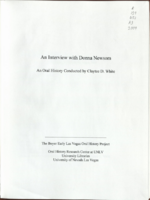Search the Special Collections and Archives Portal
Search Results

Transcript of interview with Jack W. Zunino by Stefani Evans and Claytee White, August 30, 2016
Date
Archival Collection
Description
Landscape architect Jack W. Zunino is a Fellow of the American Society of Landscape Architects (ASLA) and president of the Society's local chapter. He has designed many of Southern Nevada's iconic landscapes: the Rio Hotel, the M Resort, the Desert Demonstration Gardens, the gardens at Ethel M. Chocolates, the Cactus Avenue overpass, and most notably, the Springs Preserve. He's also a third-generation Nevadan from Elko, grandson of Italian immigrants who met and married in the Silver State and raised their large family in that Nevada mining town. The product of Elko schools, he graduated from the University of Utah in psychology and Utah State University in landscape architecture while earning his tuition as a road construction laborer. In this interview, Zunino tells of his employment with G.C. Wallace Engineering and JMA architects before founding his own landscape architecture firm in 1989. He speaks to the importance of planners and landscape architects on Southern Nevada's conser
Text

Transcript of interview with Don Laughlin by Stefani Evans and Claytee White, October 10, 2016
Date
Archival Collection
Description
Minnesotan Don Laughlin landed far from the land of (more than) 10,000 lakes. His office 90 miles south of Las Vegas in the eponymous town of Laughlin commands an unimpeded view of a very different landscape from that of his youth. Here, where the Colorado River flows south through one of its narrowest channels, Laughlin arrived in about 1966 and purchased what would become the Riverside Resort Hotel and Casino. The endeavor was so successful that the then-settlement of 10 to 15 people at that tiny spot on the river grew to be an unincorporated town housing more than 7,000 people in 2010. Today, Laughlin the man continues to promote and support Laughlin the town via flood control projects and infrastructure development. In this interview, Laughlin sits amid the antique slot machines in his office and enjoys the view as he recalls his childhood on the family farm in southern Minnesota, and talks about leaving the farm in the late 1940s for nearby Owatonna to do watchmaking and watch repairing while simultaneously running a slot machine and pinball parlor. After visiting Las Vegas on vacation, he arrived permanently in 1952 and bartended at the Thunderbird Hotel until he bought his own bar and restaurant in Downtown Las Vegas, which he named Laughlin’s Made Right Café. After selling the café, he bought the 101 Club in North Las Vegas. He began searching for a casino for a casino to buy, seeking only those located on the border of a state that did not allow gambling. When he found the small hotel/casino on the Colorado River he purchased it. He talks of building an airstrip across the street and making daily trips to Las Vegas to buy groceries, beer, and toilet paper-essentially, everything one would need to run a hotel, restaurant, and casino-sometimes making three trips in one day. He continues to own and manage his hotel/casino at the age of 85, and he is in his office every day, all day, seven days a week. He gave up flying last year because he claims he’s too old to pilot his own aircraft. So is especially advantageous that the town that bears his name can now supply almost everything that he and the Riverside Resort Hotel and Casino need.
Text

Transcript of interview with Cindy Coletti and David Fordham by Stefani Evans and Claytee White, October 27, 2016
Date
Archival Collection
Description
The interior of the green house at the end of the cul-de-sac envelops the visitor. Every room exudes comfort and encourages conversation even as the lake, lapping quietly on three sides of the house, beckons. Cindy Coletti revels in this house and its interiors, all of her own design, especially because they are so different from the daring, opulent, and award-winning custom homes for which she is known. Arriving in Las Vegas in 1988 as a single mother, Cindy immediately submitted a successful design for the first Southern Nevada Street of Dreams event and began networking. She established Sun West Custom Homes in Nevada by applying the design and contracting skills she had successfully honed by building nearly seventy houses in California, Florida, and Colorado—all the while grooming her son Danny—from the time he was in his teens—to eventually take over the company. In this interview, Cindy's husband, David Fordham, shares his background, his reasons for relocating to Las Vegas, work in commercial real estate, meeting Cindy, and living at The Lakes. Cindy then recalls the experiences that brought her to Las Vegas; shaped her ideas of self-help, friendship, design, and business, and instilled in her the confidence to succeed in a man's world. Cindy has retired from building and now enjoys traveling with her husband, but Sun West Custom Homes continues to thrive under the capable ownership and leadership of Daniel S. Coletti.
Text

Mike Montano interview, September 19, 2008: transcript
Date
Archival Collection
Description
First played in Las Vegas with Jack E. Leonard in 1960. Only worked at two hotels during his 24-year Las Vegas career - Flamingo and riviera
Text

Larry Mason interview, September 14, 2018: transcript
Date
Archival Collection
Description
Interviewed by Nathalie Martinez. Larry Mason is an Arizona native that moved to Las Vegas as a Higher Education Administrator. He was born in Tuscon, Arizona, but grew up mostly in East Los Angeles and his "Gramitas" ranch in Sonora, Mexico. He has a history in athletics as a basketball player in his upbringing which brought him to play at the New Mexico Highlands University and the European League. Earning a Masters in Education, Larry Mason came to Las Vegas to become the first Latino Director of Admissions at UNLV, first Latino President of the Board of Education, and first Latino Vice President of the Board of Education in the Clark County School District. He launched an incredible amount of movements within the educational field in Las Vegas including (but not limited to): the Mariachi program, the magnet school program, and the growth of the Diversity Division within the NSHE. Some of his greatest supporters and allies included Senator Harry Reid, John Lujan and Tom Rodriguez. Mason continues to work as a community leader for minority representation in STEM fields, as a board member for the Nevada STEM Coalition.
Text

Transcript of interview with Joanne Imprescia by David Furbush, March 20, 1978
Date
Archival Collection
Description
On March 20, 1978, David Furbush interviewed Joanne Imprescia (born October 10th, 1927 in Keokek, Iowa) about her life as a hairdresser in Las Vegas, Nevada. Imprescia discusses the growth of Las Vegas and the local social climate of the fifties. The interview concludes with Imprescia explaining her experiences as a Las Vegas business owner and the hairdressing industry in Southern Nevada.
Text

Transcript of interview with Ray Christian by Russell L. Ellis, March 19, 1978
Date
Archival Collection
Description
On March 19, 1978, Russell L. Ellis interviewed former postal worker, Ray Christian (born 1927 in Las Vegas, Nevada). The two discuss Ray’s family history and his experiences as a Black man in early Las Vegas. Ray Christian compares the experiences of his childhood with that of his children in Las Vegas. The interview concludes with Christian expressing how Las Vegas has grown and that there are more opportunities available for his children to pursue.
Text

Transcript of interview with Lois Cox by Mitch Cox, March 18, 1978
Date
Archival Collection
Description
On March 18, 1978, Mitch Cox interviewed Lois Cox (born 1938 in Ely, Nevada) about her experiences growing up in and living in Nevada. Cox first talks about her family background and then discusses her educational and employment backgrounds. She then describes her work for the Clark County School District, the changes in schools over time, and her opinions on how student activities have changed. The topics then shift to Cox’s opinions on some of Nevada’s politicians, her Basque background, and the changes in Las Vegas over time, particularly those related to gambling.
Text

Sam Diaz interview, January 3, 2020: transcript
Date
Archival Collection
Description
Interviewed by Elsa Lopez. Sam Diaz was born in Los Angeles California, but was raised in Chula Vista, California. He is a police officer with the Las Vegas Metropolitan Police Department and has worked for LVMPD since 2007. He has served in in the U.S. Air Force Reserves since 2008, and served in the U.S. Air Force from 2001 to 2007. Diaz describes his multi-cultural upbringing and growing up in such close proximity to the U.S.-Mexico border. He describes his passion for serving which he had since a young age. He describes his incorporation within every community he has been a part of and talks about the ways he has worked to serve the Las Vegas community since moving here in 2007. He recounts the tragic night of 1 October, the mass shooting that occurred during the Route 91 Harvest music festival on October 1st, 2017 on the Las Vegas Strip. He talks about the various changes that happened within LVMPD since 1 October, and changes that he has seen in the Latinx community throughout the Las Vegas Valley. Diaz also describes the process of adopting two children and raising a multi-racial family with his wife in Las Vegas.
Text

Transcript of interview with Donna Newsom by Claytee White, June 11, 2009
Date
Archival Collection
Description
Donna Newsom shares the history of her life in great detail, beginning with her childhood in Georgia and Florida. The family moved many times, following her father's work opportunities. Donna had a close relationship with her father and recalls the many daring adventures on which he took her. After graduating from high school, Donna earned a nursing degree at the Macon Hospital School of Nursing. She remembers dorm life, long hours, and the specific training nurses received in the late forties. Her career began at age 19 with a year of working at Macon Hospital as a graduate nurse, and then she made plans to leave the South. Donna's memories include moving to Houston, living in a boarding house, her first date, and working at Hermann Hospital and then Methodist Hospital. She then answered an ad to work at a Girl Scout camp in Colorado, and her roommate there became a mentor and one of her staunchest supporters. With help from her mentor, Donna went on to earn a teaching degree in Austin, Texas, met and married her husband Sam Newsom, and got involved in real estate. She relates the many experiences they had during Sam's Navy career, her teaching experience in New Orleans, and their eventual move to Las Vegas. Sam and Donna loved Las Vegas from the moment they moved here. She recalls many details of her employment at UMC, the differences in health care compared to down south, and the feeling of being safe no matter the time of day or night. Donna stays active in tutoring, the OLLI program at UNLV, and working for the Salvation Army women's auxiliary. She and Sam also get together with his golfing buddies and their wives for dinners in their various homes.
Text
